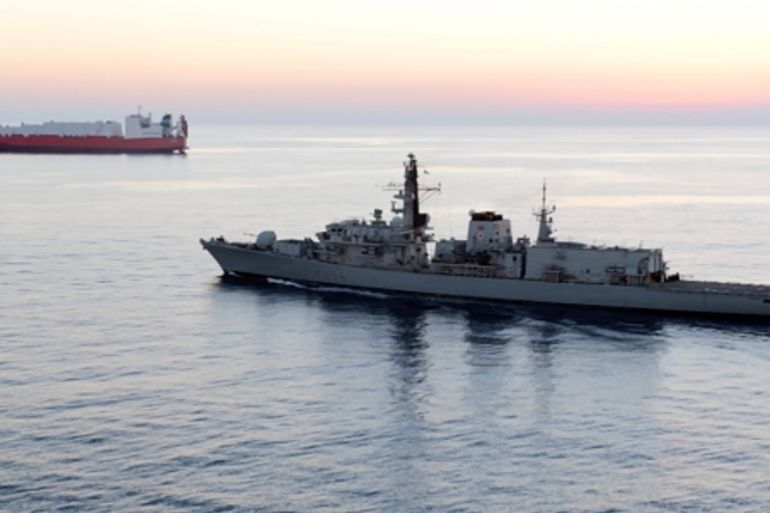Iran calls European fleet in the Gulf ‘hostile’ and ‘provocative’
UK said it is planning a European-led naval force to escort tankers through the world’s busiest oil shipping lane.

Iran denounced as “provocative” and “hostile” a British proposal for a European-led naval mission to escort tankers in the Gulf amid soaring tensions over the seizure of ships.
The condemnation on Sunday came as a Royal Navy warship arrived in the Gulf to accompany British-flagged vessels passing through the vital Strait of Hormuz.
Keep reading
list of 4 itemsWhat’s slowing down America’s clean energy transition? It’s not the cost
Global coal use to reach record high in 2023, energy agency says
COP28 Dubai is over: Four key highlights from the UN climate summit
The HMS Duncan joined the Frigate HMS Montrose in the Gulf to defend freedom of navigation, Britain’s Ministry of Defence said on Sunday.
“We heard that they intend to send a European fleet to the Persian Gulf, which naturally carries a hostile message, is provocative, and will increase tensions,” said Iranian government spokesman Ali Rabiei.
Britain said on Monday it was planning a European-led force to escort tankers through the world’s busiest oil shipping lane, the Strait of Hormuz, in response to Iran’s seizure of a United Kingdom-flagged vessel on July 19.
The capture of the Stena Impero came two weeks after British authorities detained an Iranian tanker – the Grace 1 – off its overseas territory Gibraltar over allegations it was breaching EU sanctions on Syria.
|
|
Main source of tensions
In his comments on Sunday, the government spokesman said Iran believed the security of the oil-rich Gulf had to be maintained by countries in the region.
“We are the biggest agent of maritime security in the Persian Gulf,” Rabiei was quoted as saying by ISNA news agency.
Iran’s President Hassan Rouhani said a force like that proposed by the UK would only make matters worse.
“The presence of foreign forces will not help the region’s security and will be the main source of tensions,” Rouhani said after talks in Tehran with Oman’s minister in charge of foreign affairs, Yusuf bin Alawi.
Alawi said the Sultanate, which maintains cordial ties with both Iran and Britain, was not mediating on the issue.
But he said Muscat was “concerned” about security in the Strait and was “in contact with all parties”.
“Any error or miscalculated move could hamper navigation in international waters and harm everyone,” he told state broadcaster Oman TV after meeting with Rouhani.
Britain on Thursday ordered its navy to escort UK-flagged ships through the Strait, where the Stena Impero was seized by Iran’s Islamic Revolutionary Guard Corps.
The UK’s European-led maritime force proposal has so far received a cool response on the continent because it would exclude the United States.
France said on Thursday it was not willing to send extra military assets to the Gulf, but would share information and coordinate its currently deployed assets.
The US military has said it is already monitoring the area and developing a “multinational maritime effort” dubbed Operation Sentinel to increase surveillance and security in key Middle East waterways.
|
|
High-seas standoff
An emergency meeting with parties to the landmark 2015 nuclear deal with Iran and world powers was held on Sunday in Vienna.
Tensions have escalated since the US unilaterally pulled out of the deal last year and reimposed severe sanctions on Tehran, vowing “maximum pressure” on its oil exports and banking sector.
Sunday’s talks with the remaining signatories to the nuclear deal were “constructive”, but there are unresolved issues, Iranian official Abbas Araqchi said.
Araqchi called Britain’s seizure of the tanker carrying Iranian oil a violation of the nuclear pact.
“The countries who are part of [the nuclear deal] shouldn’t create obstacles for the export of Iranian oil,” Araqchi said.
After the seizure of its tanker, Britain called for a European-led naval mission to ensure safe shipping through the Strait of Hormuz, a vital international oil shipping route where about 20 percent of the world’s energy exports flow.
Iran has threatened to disrupt oil shipments through the waterway if the US tries to strangle its economy with sanctions on its vital oil exports.
Several oil tankers were attacked in waters near Iran’s southern coast in May and June, for which the US blamed Iran. Tehran denied any involvement.
Iran in June shot down a US military surveillance drone in the Gulf, which Tehran said had violated its air space. Washington said the drone was in international skies.